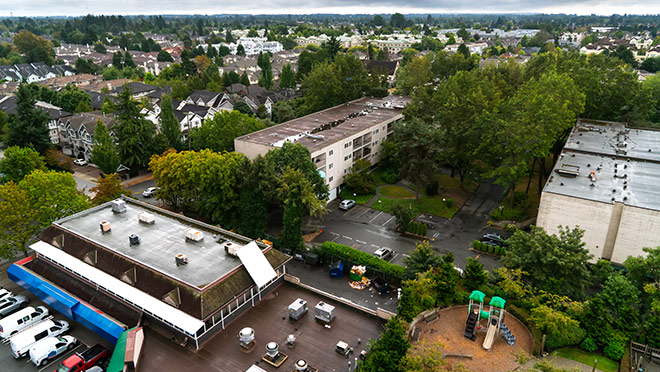What's on the roof? HVAC incentives from CleanBC

New Commercial Express program targets GHG savings for smaller businesses
The mighty heat pump is front and centre in a new CleanBC program aimed at convincing small and medium-sized B.C. businesses to cut their GHG emissions through a switch from gas to an efficient electric HVAC option.
The CleanBC Commercial Express program also includes an incentive to wean restaurants off gas in favour of electric induction cooktops, but the program focus is on replacing gas HVAC and hot water heating in the following building types:
- Small offices
- Strip mall retail
- Restaurants and food services
- Small 1-2-storey warehouses
- Gymnasiums
- Larger retail warehouses
- Multi-unit residential buildings
Key to the offering is simplicity, and no up-front costs, for the customer
There's not a big ask of customers, other than showing initial interest in a heating/cooling technology switch, and completing a short online questionnaire.
"If customers are predominantly using natural gas for their space and hot water heating, we'd like them to explore switching to more electrified, clean systems," says Oscar Ceron, senior program manager with BC Hydro.
The program is funded by the B.C. and federal governments, and is administered by BC Hydro.
CleanBC small buildings energy coach Daniel Coffey says the "express" aspect of the program is the reduced effort required by customers, who only need to answer some basic questions – such as square footage, age and location of the building, and existing systems – before handing the application over to BC Hydro. Once incentives are calculated and presented to the customer, they'll have up to nine months to get the work done by a contractor to qualify for and receive those incentives once completed.
"I think there will be a good appetite for this program, especially because there's no energy study requirement," says Coffey. "Out in the field over the past year, I found customers were somewhat apprehensive about paying money for a study, especially during the COVID-19 pandemic. They weren't keen on spending money if they thought they might get no return out of it."
The Commercial Express offer complements other existing offers such as CleanBC's Custom-Lite program, where businesses are eligible for incentives covering up to 50% of an energy study (to a maximum of $2,000) along with custom capital funding incentives based on the amount of GHG reductions. Customers will have a choice on which offer best suits them.
The goal with a fuel switching replacement is to come up with an electric heat pump solution efficient enough to offset the difference in fuel costs between gas and electricity. Coffey believes that the long-term benefits of heat pumps – which can be four times more efficient than a gas equivalent – can combine with Clean BC incentives that offset the equipment purchase, to make for a compelling switch to an electric option.
Coffey says the "sweet spot" will be customers whose HVAC systems are at or near time for replacement.
"If their equipment is nearing end of life and they need to replace it anyway, why not go for the cleaner option?," says Coffey. "Depending on your specific building project scenario, the customer can receive up to $100,000 in incentives, making it a good time to make the switch."
Work is open to all contractors, but Alliance members have an inside track
Purchase and installation of equipment is open to all qualified contractors, but BC Hydro Alliance of Energy Professionals members will be getting training and information on the program in the coming weeks. They'll also be pivotal in getting the word out about Commercial Express with their existing customers.
Again, the limited up-front ask of the customers is key.
"These are small and medium size businesses with limited staff and resources," says Ceron. "Their expertise is in their business and in fairness to them, why would they be experts in HVAC systems? They're just trying to deliver their products and services to their clients and be profitable, and given what's happened over recent months this is increasingly challenging."
Energy coach Coffey, who has specific training in HVAC systems, will be available to customers to answer any technical questions or other concerns they might have with the application process.